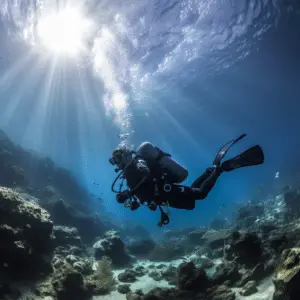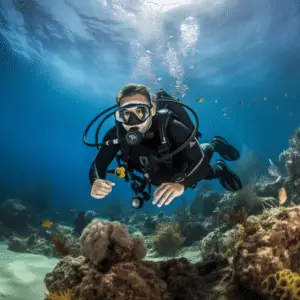
Specialized Dive Courses: Are you ready to take your diving adventures to new depths? Specialized courses in underwater photography and cave diving are available for you to explore the unique environments beneath the waves.
Underwater photography courses equip divers with all they need to capture stunning images. Learn camera settings, lighting techniques, and how to edit and enhance your pictures.
Cave diving courses provide training on safety procedures and techniques specific to cave exploration. Get tips on how to navigate narrow passages, manage low visibility conditions, and handle potential hazards.
Enroll in a specialized course today and discover the beauty and excitement of underwater photography or cave exploration!
Overview of specialized dive courses
Divers can get unique chances to upgrade their skills and discover new interests through specialized dive courses. Whether it’s underwater photography or cave diving, these courses are structured to the needs of those disciplines.
- Underwater Photography: Courses focusing on underwater photography help divers learn how to take amazing pictures underwater. They go through topics like composition, lighting, and camera settings for underwater conditions.
- Cave Diving: Specialized dive courses for cave diving teach divers how to travel securely through underwater caves. They include education in cave exploring techniques, equipment needs, and emergency plans.
- Equipment Specialization: Some dive courses concentrate on specific equipment, such as rebreathers or drysuits. These specialized courses give divers thorough knowledge and firsthand experience with the gear, helping them to get the most out of their diving equipment.
- Marine Biology: For those keen on marine life and ecosystems, specialized dive courses in marine biology provide a chance to gain knowledge about aquatic organisms and their habitats. These courses involve examining different species, their habits, and ecological relationships.
Technical Diving:
Technical diving courses are created for advanced divers who wish to explore deeper depths or longer durations underwater. These courses teach additional equipment, gas mixtures, and decompression procedures needed for secure technical dives.
In addition to these common specialized dive courses, there are many other options available that fit different interests within the diving community. From wreck diving, night diving, and even ice diving, there is a course for every daring diver looking to open their horizons.
One remarkable historical event related to specialized dive courses is the birth of cave diving as a separate discipline in the 1930s. Pioneers like Sheck Exley and Tom Mount pushed the limits of underwater exploration, resulting in the setting up of formalized cave diving training programs. Since then, cave diving has become a sought-after specialization, bringing in thrill-seekers and devoted explorers alike.
Specialized dive courses for underwater photography
Explore new depths with underwater photography and cave diving! Specialized dive courses can help you capture breathtaking images, refine your skills, and explore incredible marine environments.
For underwater photography, courses offer comprehensive training on camera equipment, lighting techniques, and composition principles. They also focus on buoyancy control, navigation, and safety to ensure photographers can confidently maneuver for the perfect shot.
On the other hand, specialized cave diving courses focus on developing the specific skills required to navigate intricate cave systems. These include line laying, navigation in overhead environments, and managing limited visibility.
Before enrolling in a course, research reputable instructors and training centers. Find reviews or recommendations from experienced divers. Also, consider joining a dive club or community to connect with like-minded individuals and continue to refine your skills after completing the course.
By taking a specialized dive course, you can enhance your skills, explore stunning underwater ecosystems, and capture unique perspectives.
Specialized dive courses for cave diving
Cave diving is an exciting and difficult activity that needs special training. Courses will give divers the knowledge and skills they need to explore underwater caves securely and successfully.
- 1. Courses in cave diving teach participants how to move through difficult cave systems.
- 2. Lessons include formation of caves, the use of equipment, emergency techniques, and buoyancy control.
- 3. Instructors discuss gas management, communication methods, and cave preservation too.
- 4. Training dives in actual caves are an essential part of these programs.
- 5. Experienced cave diving instructors lead participants throughout their training.
- 6. Advanced open water certification is usually required for these specialised dive courses.
These programs provide a unique chance for divers to observe the secret wonders of underwater caves while staying safe. With the skills learnt in these courses, divers can journey through intricate passageways and witness beautiful geological shapes.
It is important to remember that cave diving is one of the most difficult kinds of scuba diving due to its dangers and intricacies. Nevertheless, with proper training from recognised teachers, enthusiasts can enjoy this thrilling adventure with assurance.
National Geographic’s article “Exploring the World’s Deepest Underwater Caves” states that some of the most amazing cave systems can be found in Mexico’s Yucatan Peninsula. Cenotes, or natural sinkholes, give access to elaborate underground networks ready to be explored by trained cave divers.
Choosing the right specialized dive course
Research! Take time to look into dive courses that focus on underwater photography or cave diving. Seek out good organizations and instructors with experience in these areas.
Examine the course content. Is it covering all the needed skills and techniques? Do they provide hands-on training?
Check the instructor qualifications. Are they certified and experienced?
Think about the equipment. Do they provide underwater cameras or cave diving gear?
Read reviews. Ask fellow divers about their experiences.
Some courses offer advanced features.
Jacques-Yves Cousteau is an example of someone who changed underwater exploration. He co-created scuba diving gear with Émile Gagnan in 1943.
Choose your dive course wisely for a safe and enjoyable experience. Research, assess content, check instructors, consider equipment, and get recommendations. Dive away!

Conclusion
Underwater photography and cave diving are two activities that offer unique experiences. Underwater photography focuses on capturing the beauty of the sea. Cave diving entails exploring hidden caves. Both dives require special skills and knowledge.
In underwater photography, divers learn about cameras, lights, and composition. They also learn to adjust settings and do post-processing. The course gives insights into the marine world and teaches how to protect it.
Cave diving is a daring activity that requires advanced training. Divers must learn techniques such as buoyancy, line laying, and navigation to explore caves. They must understand the risks like limited visibility and complex passages. Planning and preparation are a must for safety.
These dives need certification from recognized agencies. It shows a diver’s level of proficiency and enables them to join advanced dives. Aspiring photographers or cave divers need proper training from experienced instructors before these special adventures.
David Doubilet is a renowned photographer who started as an underwater photographer by taking a specialized dive course. He perfected his art through hard work and is now one of the most respected photographers in the field. His photographs have been featured in National Geographic magazine.
Frequently Asked Questions
Q: Are there specialized dive courses for underwater photography?
A: Yes, there are dive courses specifically tailored for underwater photography. These courses focus on teaching the necessary skills and techniques needed to capture stunning underwater images. They cover topics such as composition, lighting, camera settings, and post-processing.
Q: Are there specialized dive courses for cave diving?
A: Yes, there are specialized dive courses for cave diving. Cave diving courses train divers to safely explore and navigate underwater cave systems. These courses cover topics such as cave diving techniques, equipment configuration, cave navigation, and emergency procedures specific to cave environments.
Q: What prerequisites are required for underwater photography courses?
A: The prerequisites for underwater photography courses may vary depending on the course provider. However, most courses require divers to have at least an Open Water Diver certification. Some courses may have additional prerequisites, such as a certain number of logged dives or prior experience with underwater photography equipment.
Q: Can anyone take a cave diving course?
A: Cave diving courses are typically designed for experienced divers who already hold advanced open water certifications. It is important to have good buoyancy control, dive planning skills, and familiarity with diving in challenging environments. Cave diving is a specialized form of diving that requires additional training due to the potential hazards involved.
Q: How long does it take to complete an underwater photography course?
A: The duration of underwater photography courses can vary depending on the course level and intensity. Basic courses may range from a few days to a week, while more advanced courses might span several weeks or even months. It is best to check with the specific course provider for accurate timeframes.
Q: Are cave diving courses more challenging than regular scuba diving courses?
A: Yes, cave diving courses are generally more challenging than regular scuba diving courses. Cave diving involves additional skills such as managing reel lines, diving in confined spaces, and navigating complex cave systems. It requires a higher level of situational awareness and the ability to handle potential emergency situations specific to cave environments.
